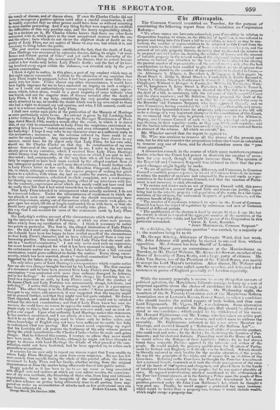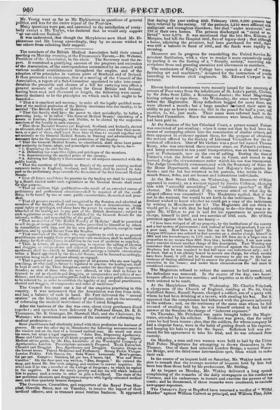While the country generally is averse to every thing that
savours of political agitation, the ararylebone Liberals manage to keep up a sort of perpetual squabble about the choice of candidates for their borough at the next indefinitely-postponed election. On Wednesday night, the members of the St. Pancras Committee and of the Marylebone Reform Association met at Lawson's Rooms, Gower Street, to select a candidate who should receive the united support of both bodies, and thus oust Lord Teigninotith, Mr. Vigor:, 3L1'., was eliairmau. Some altercation arose on the quest ion whether Sir Benjainia hall should be allowed to stand as one candidate ; which ended ium the withdrawal of his name. Mr. Howard Elphinstone and Mr. Young, who has taken an stetive part in the affairs of the parish, were chosen, alai called upon to address the assembly. Mr. Elphinstone referred to his votes when Member for Hastings, and avowed himself a " Reformer of the Reform Act"— lie was for an extension of the fratiehise to all adults of respectable conduct, who could read and write ; for the 13allot ; for shortening the duaition of Par- liaments ; and for electoral districts. Proceeting next to the !loose of Lords, he would relieve the Bishops of their legislative duties ; for he had always found those venerable Prelates opposea to the intere:ts and wishes of the people. Ile would abolish the property qualiGe ition for Members of Parlia- ment for Ireland and England, as it already W34 for Seotland. Schools should_ bib liberally endowed in each locality for the secular educritien ef the people. He was for time principles of free trade, and of course for an abolition of the Corn-laws. Referring to the Poor-laws, he thought the Poor-law Aanendment Act a national benefit, inasmuch as it _.le1 to kO._ t1 1 WAIL' Managenlelit Of the rates out of the bands of thersoliires and clergymen, and placed them in the hands of interns:min Guardians elected by the people ;lmmt hue WA; againet plurality of votes. He oNosed contrali zation, whet her m ifested in t he arbitrariness of the Poor-law Lominiesioners, or in the forcieg a Police upon the people of Hies mingliam. He would exempt from the Paor-law Amendment Act those parishes governed under Sir John Cain lloblionsea Act, which he thought a very good one. Finally, he would support a graduated tax upon incomes; which would be better than a property-tax, becauee it would include wealth, which might escape a property-tax. Mr. Young went as far as Mr. Elphinstone in questions a general Polities, and was for the entire repeal of the Poor 14w Many questions were put, and answered to the satisfaction.of every- NAY except a Mr. Taylor, who declared that he would only support "'ii out-and-out Radical."
14 was understood, that though the Marylebone men liked Mr. El- Phinstone and Mr. Young exceedingly, they by no means wished to bar others from soliciting their support.



























 Previous page
Previous page